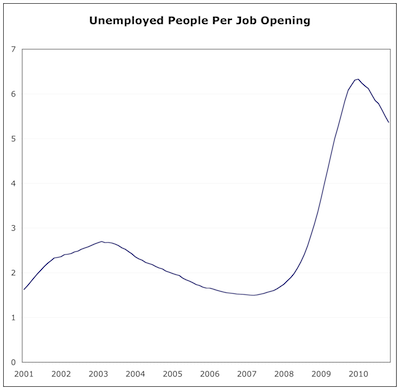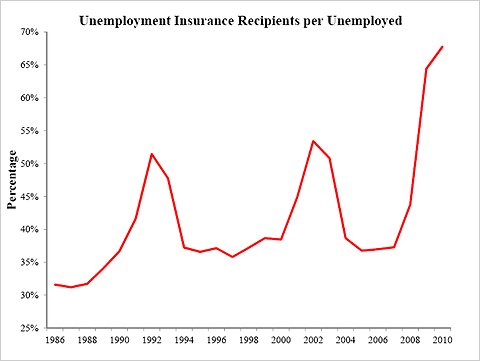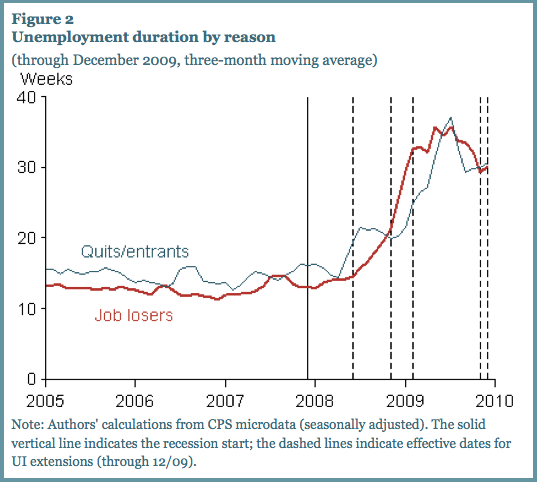Casey Mulligan Wonders Why People Use Unemployment Insurance
Casey Mulligan is curious: what could have caused the big uptick in the uptake on unemployment insurance in recent years?
It’s a mystery.
Or, maybe not:

Sorry, the JOLTS data only goes back to 2001.
Which directly addresses Mulligan’s basic assertion: People are lazy. They don’t like to work.
Well yeah. (People especially don’t like working at unpleasant jobs — those at the low end of the spectrum.)
But how lazy are they?
Rob Valletta and Katherine Kuang of the Federal Reserve Bank of San Francisco do a lot to answer that question. Returning here to an earlier post, on Valletta and Kuang’s study of unemployment insurance and unemployment. This graphic stands out:
People who quit their jobs or are just entering the job market aren’t eligible for unemployment compensation. People who lose their jobs are. The money quote:
The differential increase of 1.6 weeks for job losers is the presumed impact of extended UI benefits on unemployment duration. It is straightforward to translate this increase in unemployment duration into an effect on the unemployment rate, based on their proportional relationship and adjusted for the share of job losers in overall unemployment, which was about 67% in December 2009. The implied increase in the unemployment rate is quite small, slightly less than 0.4 percentage point, indicating that without UI extensions, the measured unemployment rate would have been 9.6% in December 2009 rather than the observed 10.0%.
Job losers (eligible for UIC) take an extra week and a half to get jobs.
So the “obvious” is true: if you pay people not to work, they will work less, in aggregate. Some people will opt for “funemployment” insurance and take the summer off. But that simplistic truism hides the truly important reality:
The effect is very small — even when you throw five UI extensions into the mix.
Simplistic arithmetic based on this study suggests that any given moment, because of UIC there are about 600,000 people not working, who would be working without it. (.004 times the U.S. work force of 150 million.) That sounds like a lot, and it’s certainly enough to inflame many people’s hot-wired “cheater resentment” genes.
But I say: Get Over It. They’re a tiny percentage, and in the big picture the effects are trivial. The shortage-of-job-openings effect utterly dwarfs the “laziness” effect.
Maybe my resentment genes are pathologically inoperative, but these numbers do a hell of a lot more to light up my compassion genes — compassion for the 14.4 million hard workers who are protected from personal economic meltdown, resulting from an economic catastrophe that was none of their doing. (I won’t even start on how the whole economy is better off as a result of their spending.)
If 600,000 people at a time get a week and a half of extra leisure along the way — the kind of extended leisure time that I, lucky soul, have been blessed with throughout my life — I say more power to ’em.
Cross-posted at Aysmptosis.



Even thinking that theat 1.6 weeks is evidence of the number of deadbeats is misguided. UI helps make sure that emplyees have time to find the right job. Taking a lousy job that is a misfit ensures another job change in the future. Taking an extra couple weeks to find the right job is a good thing. It is particularly good for employers (who are the ones funding UI in normal times).
There are deadbeats, but they are far more uncommon than some people like to believe.
Arne
said what I was going to say. Being unemployed is no fun. Even if you collect an unemployment check.
The real point of the essay is to demonstrate that there are damned liars who write this stuff with no other motive than getting paid to lie by people with no other motive than to increase the amount of human suffering in the world.
People were so depressed at the fall of Lehman Brothers they just quit their jobs so they could mourn.
Not.
That Mulligan has any credibility anywhere says something about the “science” of economics.
Taking any old job is mentioned as a possibility by those people who exalt pride and hard work as virtues in themselves. I suppose they are, but most virtues become vices or at least self destructive when followed in the wrong circumstances.
A civil engineer taking a cashier’s job at Wal-mart does at least three bad things by way of this proud willingness to work. (which is oddly also presented as humble – another misused virtue.)
— He wastes his own training and experience for the duration of his stint there.
— He and others like him misrepresent the unemployment rate.
— He fills an employment spot, so it is no longer accessible to another person who may never qualify for a more demanding job.
Officially I am not “unemployed” because I have a similar job. I am retired and the pay is nothing more than pin money (a half-day a week.) I would give someone else the spot except my employer has had awful sales this year and has cut everybody’s hours to the bone, and isn’t hiring anyone new.
I wish there was a way to quantify what a job is on a sliding scale. A median wage position with benefits, for instance, might qualify as a full “job,” where my position with no benefits and far fewer hours is only about 3% of a job. Thus, I am 97% unemployed. Good thing my mortgage is paid off…
Dale –
The motives are greed and acquisition. Increasing h amount of human suffering is just a bonus.
JzB
Geeze – yuo’d almost think there was a fixed number of jobs . . .
JzB
Noah also takes a Mulligan.
http://noahpinionblog.blogspot.com/2011/12/wages-and-great-vacation-casey-mulligan.html
JzB
“Which directly addresses Mulligan’s basic assertion: People are lazy. They don’t like to work.”
And he proves his own point by not correlating the data points.
fraud:
Or maybe the jobs are not available which would correlate with the rise in NILB.
Fraud
hard to tell exactly what you mean. that laziness comes in cycles and periodically people just get lazy and take time off and that causes recessions?
or the fact that people are lazy and don’t like to work at meaningless jobs.
my observation is that people love to work when the work means something to them, either in itself or by its contribution to the welfare of their immediate “family.”… this might be a bit tricky. a man will work in a coal mine to support his wife and children but he won’t like it. on the other hand if there is a harvest and a huge amount of not especially creative work to do to get the harvest in… men will work hard with joy.
generally, the only “lazy” people i see, are slaves.
now the fact is that our economy does not provide a lot of interesting and vital work. the fact that people work at all is testimony to the fact that they are not “lazy.” they work bravely for years.
but even pigeons in a skinner box need to take breaks.
the whole program of people like Peterson and Romney is to deny the poor any breaks.
for what it’s worth, i once worked in a sawmill where the head rig broke down fairly frequently leaving the men on the line with nothing to do until it was fixed. management’s response to this was to give very ugly looks to anyone who did not pretend to be busy during the breakdowns. it just drives some bosses crazy to think of “their money” being wasted by idle workers.
this is a mental illness. give workers a reasonable chance to “cooperate” with the boss and they will work their hearts out. treat them like slaves and they will act like slaves.
fraud:
Or simply said, maybe the jobs are not available which would correlate with the rise in NILF or people just giving up.
The problem with capitalism is eventually the capitalists run out of exploitable resources.